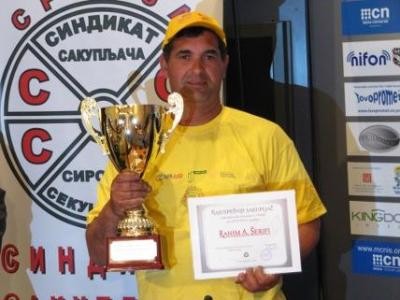
To support his nine-member family, Rahim Serif works 11 hours a day, digging through Bujanovac’s rubbish in search of recyclable materials.
Some days he scours landfills; other days he visits industrial complexes. Although the locations differ, Serif is constantly exposed to poisonous chemicals and bacteria that cause disease.
Serif travels 80 kilometers a day in his horse-drawn wagon in search of “secondary raw materials” like scrap iron, tin, aluminum, copper, brass and paper. For generations, Serif’s family has practiced this trade, with no recourse or alternative. Such is the plight of an estimated 8,000 Romani families in Serbia.
"We work—often without gloves—in filth and dirt, in high temperatures and bitter cold. It’s a hard life,” says Serif, 42, who in 2011 collected a record 55 tons of recyclable material.
Rewards, financial and otherwise, are few. But Serif received an award in 2011 from the Union of Secondary Raw Materials Collectors, the first organization of its kind in Serbia, for being the country’s most productive collector.
The award was presented by the Yurom Center, a Nis-based organization supported by USAID through the Institute for Sustainable Communities. Yurom helps train Roma from 10 Serbian municipalities in advocacy skills. The Roma, in turn, formed the Union of Secondary Raw Materials Collectors, a national civil service organization, to represent their interests.
In Serbia, similar to many other Balkan countries, the poor recycle society’s wastes. Their work is unregulated, unregistered and underpaid.
With USAID financial assistance, social activists from the Yurom Center have been designing measures to gradually integrate independent waste collectors into the country’s formal waste-management systems. Over the past year, the Yurom Center has worked with Roma activists in 10 Serbian municipalities to improve their organization and business management skills so they can create new jobs and public policies that benefit secondary raw material collectors and Roma-run microenterprises.
During the past year, significant steps have been taken to reform local and national waste management systems. As a result of lobbying efforts, the National Employment Service has registered and codified the collection of secondary raw materials as a legitimate occupation. Trash collectors are now able to register their businesses with the Service, and plans are under way to secure health and disability insurance and pension plans for these workers.
A new sense of dignity and civic and social responsibility in Roma settlements has been awakened by the Union of Secondary Raw Collectors.
“In Nis, the Union has helped us to fight police citations,” said Asim Music, a Roma collector, who hopes “the Union will help us with everything.” He says trash collectors need tractors to collect materials faster, as well as storage space so they don’t have to pass through the center of Nis on their horse-driven wagons, or sort trash at their homes. Music earns about $34 (3,000 dinars) daily working from sunrise until sunset with his two children and four nieces and nephews.
The 350-member Union of Secondary Raw Collectors plans to raise awareness among local and state authorities about the urgent need to draft new laws to better regulate waste management. While the Union acknowledges that it faces numerous hurdles, members say the future looks brighter for Roma collectors than at any point in their recent history.
Current recycling rates in the Balkans are far lower than in Western Europe. For example, 97 percent of Serbia’s waste ends up in landfills, which is the most environmentally destructive way to dispose of refuse, while Austria completely reverses the equation and recycles 97 percent of its waste with only 3 percent going to landfills. By moving closer to European Union standards and by increasing the amount of waste that is recycled, Serbia’s recycling industry will grow and Roma scrap collectors will profit in the process.







Comment
Make a general inquiry or suggest an improvement.